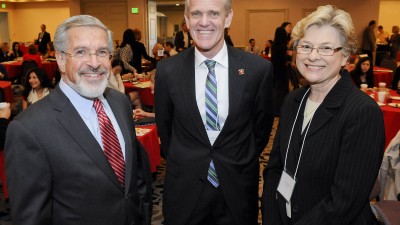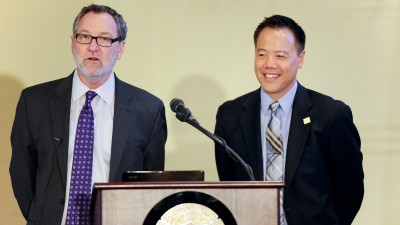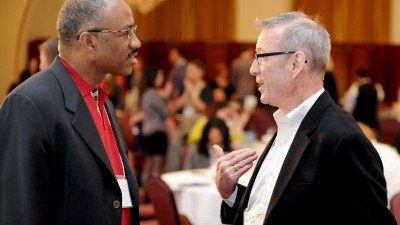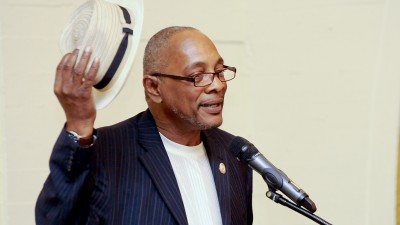
While overall health quality was the main issue of the day, the conference specifically examined ways to improve medication use and safety. The U.S. currently spends about $300 billion a year on prescription drugs and another $300 billion fixing problems resulting from non-adherence to medication regimens.
In keeping with its collaborative theme, the Optimizing Medication Safety and Healthcare Quality conference was sponsored by USC Mann and the USC Leonard D. Schaeffer Center for Health Policy & Economics along with the U.S. Department of Health and Human Services’ Center for Medicare and Medicaid Services (CMS) Innovation. Nearly 200 people attended the event, held at the University of Southern California on February 20 and 21.
Keynote speaker Leonard D. Schaeffer—the Judge Robert Maclay Widney Professor at USC and benefactor of the USC Schaeffer Center—said we are looking at a decade of continuous and unpredictable change. He explained that the incremental unfolding of the ACA over 10 years presents an environment in which stakeholders will advocate for changes that support their specific interests while regulations will vary across state lines, creating inconsistency as well as unsustainable debt and fiscal-crisis-driven policy. Ultimately this makes healthcare costs a national security issue.

“Healthcare costs are driving the deficit,” he said. “We can afford everything except healthcare.” On a brighter note, he added: “You have opportunities to meet the challenges created by fiscal pressure, regulatory change and consumerism that are driving a rationale for collaboration. It’s up to each of you to help shape the future and not be its victims.”
Preceding Schaeffer at the podium was R. Pete Vanderveen, dean of USC Mann, who launched the conference with a message promoting collaboration as the best way to serve patients in today’s changing healthcare environment.
Mark Loafman, associate professor at the Feinberg School of Medicine at Northwestern, described a current healthcare system and workforce that can be greatly improved through interdisciplinary teams. His presented the physician’s perspective on the value of an integrated approach in which physicians, pharmacists and nurses work together to not only improve patient outcomes but also save healthcare dollars. Loafman also is a leader of the Patient Safety Clinical Pharmacy Services Collaborative and a physician adviser for the Federal Health Futures Group.
Dennis Helling, executive director emeritus of pharmacy operations and therapeutics at Kaiser Permanente-Colorado, talked about Kaiser’s cooperative approach to patient care and the value that it has brought to the system and its patients.

Overwhelmingly, the day’s presentations focused on opportunities for increasing value in healthcare through interdisciplinary teams, with an emphasis on the role pharmacists play in managing medication use. Speakers shared their experiences in various venues, including safety-net clinics, accountable care organizations, hospitals and community pharmacies. Attendees also looked at current approaches to helping patients manage their health, including face-to-face appointments and telephone consultations.
Lunch speaker Alexander Capron, University Professor and a leader of the USC Health Systems Improvement Collaborative, described the need for better communication with patients in order to improve health outcomes. For instance, he noted that primary care providers must work to ensure that prescribed medicine is actually taken as directed.
“The old model—in which physicians simply bemoan patients’ noncompliance—will have to change,” he said. “And this means a change of attitude … and a change of the frontline provider to someone with expertise in facilitating proper medication use.”
Dennis Wagner, co-director of the Partnership for Patients, CMS Innovation Center, participated in the conference from Washington, D.C. He discussed how CMS is testing novel care models in real time so that those demonstrating better quality and lower cost can be implemented more quickly. He also explained Partnership for Patients’ focus on reducing preventable hospital-acquired conditions by 40 percent and reducing hospital readmissions within 30 days by 20 percent.
“Medication safety is central to our work,” he said. “Multidisciplinary teams and the integration of clinical pharmacy services can help achieve our important national aims.”

Steven Chen, associate professor at USC Mann, and Michael Hochman, medical director for innovation at AltaMed Health Services, shared insights on their CMS Innovation grant project that is integrating clinical pharmacy teams in several sites and evaluating their impact. So far, at the midpoint of their project, feedback has been positive from staff, patients and the quality team.
“Now we have to make the business case for clinical pharmacy services,” said Hochman, alluding to new payment options that need to be used to cover the services. Chen focused his comments on how the integration of pharmacy teams aims to produce $31.7 million in savings during the three-year grant period while also improving health outcomes.
Taking the discussion to the community pharmacy setting was Kermit Crawford, president of Pharmacy-Health and Wellness for Walgreens, who stressed that pharmacies are the most accessible points of care nationwide. “Sixty-three percent of all Americans live within three miles of a Walgreens store,” he said. “At Walgreens, we’re freeing up our pharmacists so that they can interact with patients face-to-face and improve adherence.”
Roosevelt University College of Pharmacy in Chicago Dean George MacKinnon noted, “The silent killer is [commonly considered to be] hypertension, but the real silent killer is unmanaged medication use.”
Dinner speaker Kevin Michael Key shared a unique perspective with attendees—one that went to the heart of the reason for the conference itself. “I’m not a physician, a pharmacist, a nurse or someone who has to pay for everyone’s healthcare,” he said. “But I guess I’m the reason you’re here, because I am a patient.”
Key shared his personal story of when his life and health were “really in the toilet” and he had out-of-control diabetes and blood pressure—which had claimed his father’s life at age 44—and “sky-high” cholesterol. “I felt like I was doomed to die a horrible diabetic death,” he said.

Then he found his way to Center for Community Health, part of the JWHC Institute, and a team of healthcare providers – including JWCH chief medical officer Paul Gregerson and USC School of Pharmacy’s Steven Chen – who “worked with me tirelessly” and “saved my life.” Key explained how Chen met with him regularly, adjusting his medications and dosages until they found the optimal approach.
“It’s all about teamwork, and we’re all on the same team,” Key said as he publicly thanked those who partnered on his care.
“My very out-of-control life is now in control,” said Key, who is returning the favor to others. “The clinic where I was treated now employs me to help patients with diabetes stick to their medicines, eat right and exercise so they can get in control, too.”

